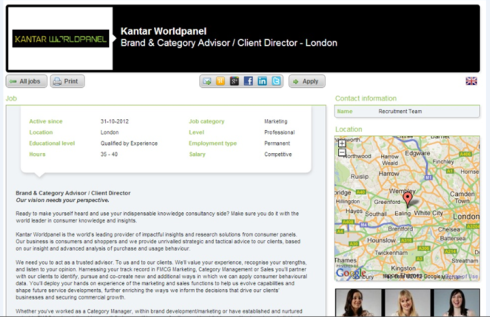About a month back after reading a few articles concerning original and innovative ways companies were using to engage and attract candidates; I decided to throw the question out there on various professional networking groups across the World, “What are the most innovative recruitment/candidate attraction methods you’ve used or come across? More importantly how effective were they?
I had some great feedback and decided to compile them for all to see. I think I may even keep this running as a series every few months.
One of the overriding themes of the responses was the difficulty with balancing innovative/fresh ideas with targeting the right demographic/skill set whilst providing a ROI. What is innovative in one industry is not necessarily innovative in another. It was great to see ideas covering every stage of the recruitment process, including consideration of the very message you want to covey before the planning process even begins. Mitch Sullivan of FT Recruitment Ltd, pointed out that at the very beginning of any attraction strategy, many companies could be more innovative simply by “spending more time articulating their employment propositions with more vigour, creativity and honesty.”
Charles Fiddes Payne of Mr Ted, supplier of global talent acquisition solutions, suggests profiling the top 5% of your employees in each job function. This will allow you to more efficiently harness various networks by focusing on finding similar candidate profiles. More focus should also be afforded to referral campaigns relating to line managers with difficult to fill and ‘mission critical’ roles. Your existing talent can lead you to online professional networks, expert forums and technical experts needed to drive your employer brand forward. The best talent may not say yes to an interview straight away. But if you market to them on a consistent and regular basis, engage them in discussions, forums etc, this makes it far more likely that when they do decide to move jobs, they will think of you.
So in terms of practical examples recruiters provided, where do I start. Well how about with Hackers, Poker & Speed Dating!
Dean Da Costa of Microsoft in the states came up with a great case on how he’s previously attracted IT Security Personnel (Ethical Hackers). Dean and his team created a dummy database and set up a contest for Hackers. The prize, a cash reward for the hacker that was the quickest to hack into the database and find a specific piece of information. Candidates had to register to enter the contest. As well as receiving a lot of attention and candidate details, they actually hired the winner.
Governments from around the World are using similar competitions to attract teenage hackers to act as ‘Cyber Warriors’ on the front line of national security. A recent article in the June edition of Wired Magazine called ‘Teen America – Digital Patriots’ illustrates in detail an annual air force competition called CyberPatriots; a national talent search to find 10,000 young Americans to be the ‘Top Guns of cyber security. Applicants (with an average age of only 16) are placed into teams, each of which is given a network of 5 computers running 7 operating systems to defend over a gruelling 8 hour period of relentless attacks by an official group of hackers. South Korea, Israel and China all use hacking contests to recruit and train local teenagers.

These contests also illustrate the ethical recruitment dilemmas Governments face in the war for talent.
CyberPatriots is primarily a defensive contest; Net Wars on the other hand, encourages offence as a method of defence. A “don’t ask, don’t tell policy” relating to the backgrounds of contestants is operated. In order to recruit the best talent, potential illegal activities that candidates may have been involved in, that initially equipped them with the skills to win the competition are overlooked. The competition does however provide the opportunity for contestants to use their skills in a legitimate future career; the argument being, without this choice they are likely to resort to hacking illegally.
 Susan Hailey demonstrated an alternative competition to attract her top talent, namely the MBA World Series of Poker! In order to enter candidates needed to register their CV’s. These resumes were used to help find summer interns. The resume database itself was made available to sponsors of the event looking to recruit MBA’s. The result was a great way to connect with candidates interested in the business, and an opportunity to enhance their employer brand within a coveted target audience. The event also received the thumbs up from the marketing department who were able to cross market their services to the MBA’s as consumers.
Susan Hailey demonstrated an alternative competition to attract her top talent, namely the MBA World Series of Poker! In order to enter candidates needed to register their CV’s. These resumes were used to help find summer interns. The resume database itself was made available to sponsors of the event looking to recruit MBA’s. The result was a great way to connect with candidates interested in the business, and an opportunity to enhance their employer brand within a coveted target audience. The event also received the thumbs up from the marketing department who were able to cross market their services to the MBA’s as consumers.
Both the hacking competition and the MBA Poker Tournament demonstrated a great ROI for the organisers. Something a little less proven recently launched by the South China Morning Post in Hong Kong, is a speed dating event for recruitment. The effectiveness is yet to be seen but Edward McKay of NES Global who notified me of the event, sees the benefit in being able to better qualify candidates face to face compared to phone interviews and CV’s. I would be very interested to know what candidates think of such an event and will keep an eye on this one.
Secret Codes, Events & Career Fairs
I received a number of examples of outdoor advertising ranging from handing out flyers to the public queuing up to buy the latest Xbox (which resulted in successful hires) to video advertising at the local baseball park.
One of the classic examples of outside advertising sent to me by Ted Meulenkamp referred to the billboard advert that Google placed at the heart of Silicon Valley (2004). The billboard which displayed a complex mathematical question would eventually lead you to a URL address, a page of Google Labs (their R&D Dept) which read: “One thing we learned while building Google is that it’s easier to find what you’re looking for if it comes looking for you. What we’re looking for are the best engineers in the world. And here you are.”

Many of us have been involved one way or another in a career fair, whether in the physical or virtual world. It was interesting to see what different approaches recruiters took to make them a bit more engaging.
Daava Mills of Vigor Industrial in the US arranged an on-site Saturday recruitment fair with 10 hiring managers present to conduct interviews there and then. The result was a successful event resulting in cost effective candidate attraction that was lots of fun for all involved. Daava mentioned that it was not the most innovative of methods, although I feel that (depending on the industry) convincing 10 hiring managers to give up their Saturday is pretty good going. As a candidate I was always a little frustrated that more companies did not cater for evening interviews (which was another response I received) the way recruitment agencies do. Obviously internal recruiters and line managers have a life too, but I feel this type of flexibility should be considered, at least for mission critical positions.
Virtual career fairs hosted by the likes of Second Life were mentioned by numerous respondees; however no one appeared to have actively engaged in one or could provide a ROI. I would be interested to hear from anyone who has been involved in such an event.
The hosting of events and focus groups was a tactic that repeatedly turned up albeit with different approaches and styles. The most successful events were targeted at a specific audience and involved inviting speakers that could share significant insights and experience. Patrick Feehan of the Bergen Briller Group hosted such an event, successfully providing the opportunity to network and share information about their brand and career opportunities. In addition Patrick was able to perform some interesting global talent sourcing in relation to candidates who were based in Europe, but were open to returning home to targeted areas within Asia and Africa.
Graduates, Ice Cream & Social Recruiting
 Graduate recruitment examples were also popular among the response I received. On campus, sponsoring cups dispensed from coffee machines and exchanging free ice cream for CV’s were cited. Some companies even used fully corporate branded ice cream vans.
Graduate recruitment examples were also popular among the response I received. On campus, sponsoring cups dispensed from coffee machines and exchanging free ice cream for CV’s were cited. Some companies even used fully corporate branded ice cream vans.
Many companies are incorporating social media into their graduate attraction strategy. Deloitte New Zealand, winners of the 2010 SOCRA International award for their social recruiting activities, demonstrates fantastic use of Facebook for attracting Graduates. Deloitte combine live-streaming video with their Facebook page to provide an interactive and engaging experience for prospective students who can watch and listen to a range of teams from different locations talk about their experiences. Fans are able to type questions into the Facebook page and get answers during the broadcasts.
With all the talk about new media these days, Guy Battagliaof TGB Associates in NYCbrought up an interesting point about Radio. Although he listens to radio all the time, he rarely hears a job being advertised. I have to admit, this side of the Atlantic I often listen to radio in the morning and also rarely hear any jobs being advertised. It should be noted the use of radio for job advertising is likely to vary greatly between geographies and radio stations. For example, S1 Jobs, the Glasgow based Scottish job site, cross advertise selected jobs from their site on targeted local radio stations; great for driving additional traffic to their site and increasing the brand awareness of their clients.
Well, that’s it for the opening round of Most Innovative Recruitment Strategies. I’ll keep this going as a series and hopefully sooner or later, you’ll see an idea that can be applied to your own recruitment strategy. I’ve tried to include as many answers as possible and apologies to anyone who I’ve missed.
If you would like to share your own ideas feel free to post a comment.
By Jean-Paul Smalls of VONQ UK
Tags: Direct recruiting, Facebook Recruitment, In-House Recruiting, in-house recruitment case study, innovative recruitment, innovative recruitment strategies, Mobile Recruitment, recruitment advertising, social recruiting, virtual career fair
 A couple of months back I was working on a particularly tricky campaign to attract a ‘Client Director’ level candidate for a leading market research firm – Kantar Worldpanel. The combination of skills and experience required for these types of brand and category advisory roles is unique, and not easy to come by; we knew we needed to attract passive candidates.
A couple of months back I was working on a particularly tricky campaign to attract a ‘Client Director’ level candidate for a leading market research firm – Kantar Worldpanel. The combination of skills and experience required for these types of brand and category advisory roles is unique, and not easy to come by; we knew we needed to attract passive candidates.










